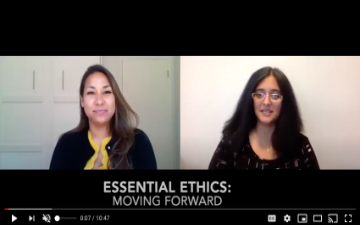
Anita Varma, PhD, is the assistant director of Social Sector Ethics as well as Journalism & Media Ethics. Views are her own.
“Nothing about us without us” is best known for its use in disability rights activism. The phrase captures how people with disabilities articulated a collective stance against top-down policies and infantilization of their needs. Calling instead not only for passing consideration but genuine consultation, many have successfully influenced policies that directly affect their communities. The same dynamic is sorely needed in conversations about the ethics of work in pandemic times.
For example, the wide-ranging impact of shelter-in-place and social distancing requirements on the social sector, even several weeks in, may not be immediately apparent to all decision-makers in government agencies and elected positions. This is understandable, given how many constituents and groups are fighting for recognition and attention.
Ethical plans for how towns, cities, countries, and the world will adapt to a new reality of coronavirus need to be crafted in consultation with affected communities. The people closest to vulnerable (and easily-overlooked) communities are often those who serve them: namely, nonprofit organizations.
This week, I had the opportunity to speak to three nonprofit leaders in the Bay Area: Mary Cortani of Operation Freedom Paws, Jennifer Radics-Johnson of the Alisa Ann Ruch Burn Foundation, and Matt Bell of Via Services. These interviews, linked below, offer direct insight into what nonprofit organizations and their stakeholders are experiencing both due to shelter-in-place and due to the economic downturn.
The key takeaway of the interviews is that coronavirus certainly affects corporations, independent businesses, students, and medical workers, but also affects smaller communities in ways we might not expect. We need to take these communities into account when planning for what should happen next.
As decision-makers craft steps for “reopening” in phases and stages, much of the conversation has been about restaurants, movie theaters, and airlines. Ethical plans also need to take into account members of vulnerable communities who depend on nonprofits for services that the marketplace does not provide accessibly. “Nothing about us without us” begins by consulting the people affected to craft plans that affect them, not to compromise on the grave public health concerns but to develop creative ways to keep the nonprofit sector healthy as well.
The video interviews are available below.
